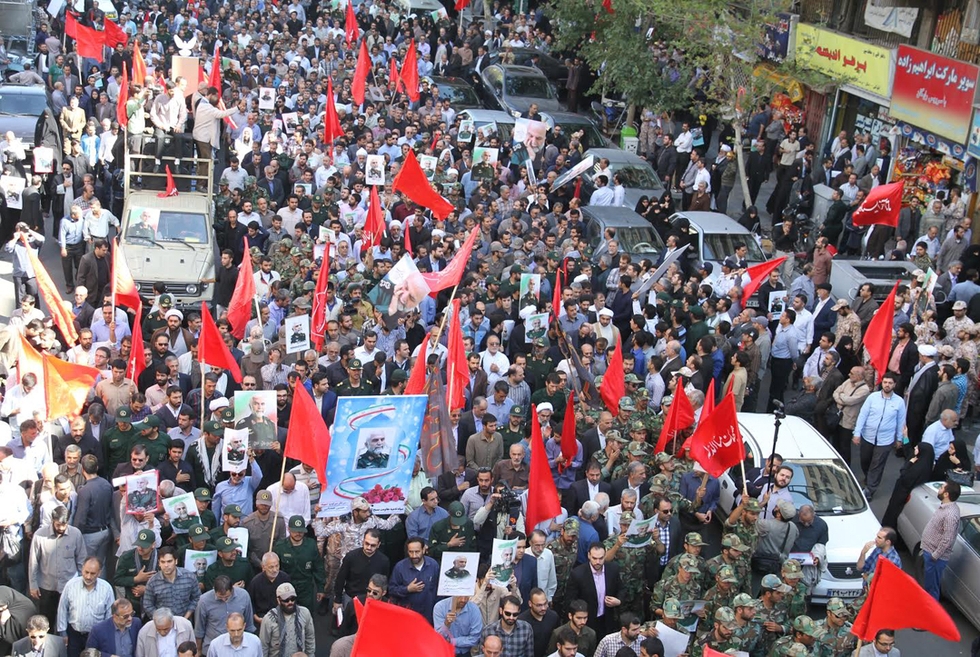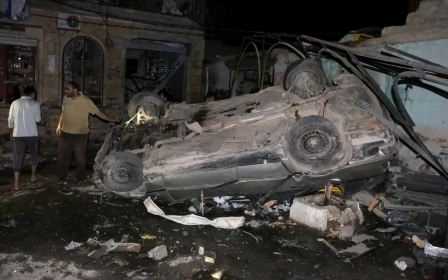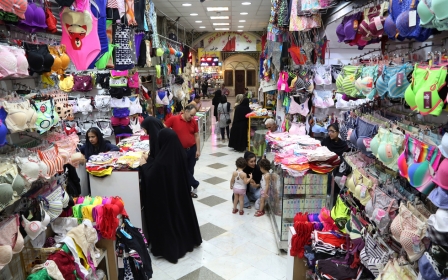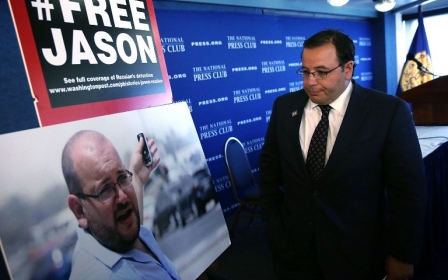Thousands gather to mourn Iranian general Hamedani

TEHRAN - As Iran prepares to bury Brigadier General Hosein Hamedani in his hometown of Hamedan on Monday, new details have emerged about the military career of the man who led the Revolutionary Guards' "advisory mission" in Syria from 2011 until just a few months ago.
Thousands of Iranians attended a public funeral for Hamedani in Tehran on Sunday.
Observers said the turnout for the ceremony, which was advertised in advance on state television, was lower than expected.
Having served in Syria for four years, Hamedani was recently appointed to a new post based in Tehran, Iranian officials said, though the exact nature of his new assignment was not revealed.
About three weeks ago, he embarked on what was supposed to be a brief visit to Syria to conduct an assessment of the military situation there. He was killed in a car accident late on Thursday, 8 October, after enemy militants on the outskirts of the city of Aleppo detected his vehicle, officials said.
MP Esmail Mohammad Kowsari, a former brigadier general of the Revolutionary Guards and member of the Parliament's national security and foreign policy committee, said that although Hamedani had been assigned to "another responsibility" just a few months ago, he was chosen for the fatal assessment mission because of his extensive experience in the country.
"A few months ago after finishing his mission [in Syria] he came back to Tehran to be reassigned to another responsibility. But because of his deep expertise in Syria he went back for a short period to survey [the situation]. And he became a martyr as he wanted," Kowsari said in an interview with Tasnim news agency, which is affiliated with the Revolutionary Guard.
Ali Shamkhani, secretary of the Supreme National Security Council of Iran, told state television that the assessment was being conducted in view of Russia's recent entry into the Syrian conflict.
"Based on developments in these three weeks in Syria and the entry of the Russian factor [into the war], Hamedani was conducting an undercover reconnaissance mission in an area with three members of his group," Shamkhani said. "They [the enemy] suddenly recognised his activity and he was killed in a car accident. He became a martyr in his reconnaissance arena."
Mohsen Rezaei, a founder and former commander of the Revolutionary Guard and secretary of Iran's Expediency Council, told Mashregh news agency on Sunday that Hamedani had been involved in 80 high-level operations in Syria since 2011.
"He transferred his experience to the Syrian army to build popular mobilised forces … and established the Zeinab headquarters in Damascus and Roghayye headquarters in Aleppo," Rezaei told Mashregh news on Sunday.
Rezaei also compared Hamedani's role in Syria to that of Ahmad Motevasselian, a former Revolutionary Guard leader, in Lebanon in the wake of Israel's 1982 invasion: "In the same way that Motevasselian in 1982 went to Syria and then to Lebanon to transfer knowledge for orchestrating waves against occupation from which Hezbollah emerged, Hamedani's knowledge organised tens of thousands of Syria's young generation."
Hamedani will be promoted posthumously to major general, the highest active rank in the Revolutionary Guard.
Early beginnings
According to two official published memoirs It's a Sacred Duty, Brother, and Moonlight of Khayyen Hamedani was a man of humble roots.
Born in the city of Hamedan on Dec. 15, 1950, Hamedani had two older sisters and a younger brother.
His father, Ali, a technician in Abadan Oil Refinery, died when he was just three years old, leaving his family without a breadwinner. As the oldest son, Hamedan was compelled to work throughout his childhood and do his schoolwork at night.
His formative years were influenced by a current of ideas that would give rise to the 1979 Islamic Revolution. He was a student of Ayatollah Madani, the representative of Ayatollah Ruhollah Khomeni in Hamedan province, who was later assassinated by Mujahadeen-e-Khalq.
Hamedani began his military career in Hamedan in 1979, enlisting in the IRGC after Kurdish groups launched an armed secessionist rebellion and attacked Iranian army bases in Kordestan.
The following year, Hamedani helped form the Revolutionary Guards' 32 Ansarol Hosein brigade in Hamedan province, and at the onset of the 1980-88 Iran-Iraq war, he became its commander.
As the Iran-Iraq war wore on, Hamedani rose through the Revolutionary Guard ranks. He served as commander of Brigade 16 Qods, based in Gilan province, and was then promoted to deputy operations commander of the Revolutionary Guards' Qods headquarters, under the command of current IRGC commander Mohammad Ali (Aziz) Jafari.
Supreme Leader Ali Khamenei decorated him with two Fath medals in recognition of his victories in key battles.
In the years after the war, he was appointed chief of staff of the Revolutionary Guard Ground Forces, and later as deputy commander of the Basij forces.
In 2008, he was named chief commander of the Mohammad Rasulollah Brigade in Tehran province. During his tenure in the post, Tehran was rocked by a wave of demonstrations following the hotly contested 2009 presidential election, and Hamedani became an outspoken critic of the so-called Green Movement that denounced the poll as fraudulent.
On April 12, 2011, he was subjected to sanctions by the European Union, which identified him as "one of the men responsible for human rights violations" in Iran. The EU said then that Hamedani and his Rasulollah brigade had played "a significant role in the violent crackdowns against protesters throughout 2009".
'Just following orders'
But in an interview with the Javan Hamedan online news outlet four months ago, Hamedani defended the Iranian government's response to the protests, while still expressing his contempt for the Green Movement's leaders.
In 2009, "the leader [Khamenei] issued an order saying that he could not accept that even one person be killed from any side. So we didn't grant the right of carrying weapons to anyone. It was so dangerous, but nobody in the Iranian armed forces used weapons," Hamedani said.
"During this time, in my overview, [Green Movement leaders Mir Hossein] Mousavi and [Mehdi] Karroubi's role in provoking some people to come to the streets and destroy public property was so significant – if I were in the jury I would order them to be executed. But the leadership didn't agree to any kind of violence … so I as a commander, against my own opinion, just did my duty [and followed orders]."
In the same Interview, Hamedani said that he had tried throughout his deployment in Syria to emphasise the need for Syrian leaders to be more open with the Syrian people.
"When they chose me for the adviser mission to Syria and Major General [Ghasem] Soleimani introduced me as his representative there, the Baath party had iron walls and a steel door," he said, describing the regime as a closed system.
"But with our conversations something miraculous happened. … In the first month that I went with three people – two of them Lebanese – nobody from the Syrian side even listened to us. In that time the Free Syrian Army had organised more than 100,000 forces. We wanted to tell them [Syrian officials] that the problem in my opinion was due to their overview of arrogance. … With time and through our dialogue and transferring our defence culture of leaning on the people, I think Syria will have a better future."
He recalled how Soleimani had once told him he could bring a Revolutionary Guard brigade to Syria and promptly end the crisis.
"But finally we said this would not be local or deep. It's better that they gain deeper army experience and have the protection of their own people. We just had to show them the way."
A longtime comrade in arms of Hamedani, former Brigadier General Hosein Allahkaram, now a professor at Emam Hosein University and the National Defence University, said his friend had succeeded in transferring a wealth of knowledge to the Syrian army.
"Hamedani went to Syria to transfer this culture [of resistance]. … The most important characteristic of his is that he was a strategic commander," Allahkaram told Middle East Eye.
"He had in his past fought with terrorism, fought in a civil war in Kordestan, fought in the mountains with Iraqi Special Forces, fought with the third army of Saddam Hussein in desert lands, and when the Iraqis occupied Sarpolzahab he organised forces to liberate it. And he had the experience of defending against a Western media war after the 2009 election that they won in Georgia and Ukraine but couldn't win in Tehran. He was a strategic commander who went to Syria to transfer all of this knowledge to the Syrian army."
New MEE newsletter: Jerusalem Dispatch
Sign up to get the latest insights and analysis on Israel-Palestine, alongside Turkey Unpacked and other MEE newsletters
Middle East Eye delivers independent and unrivalled coverage and analysis of the Middle East, North Africa and beyond. To learn more about republishing this content and the associated fees, please fill out this form. More about MEE can be found here.




